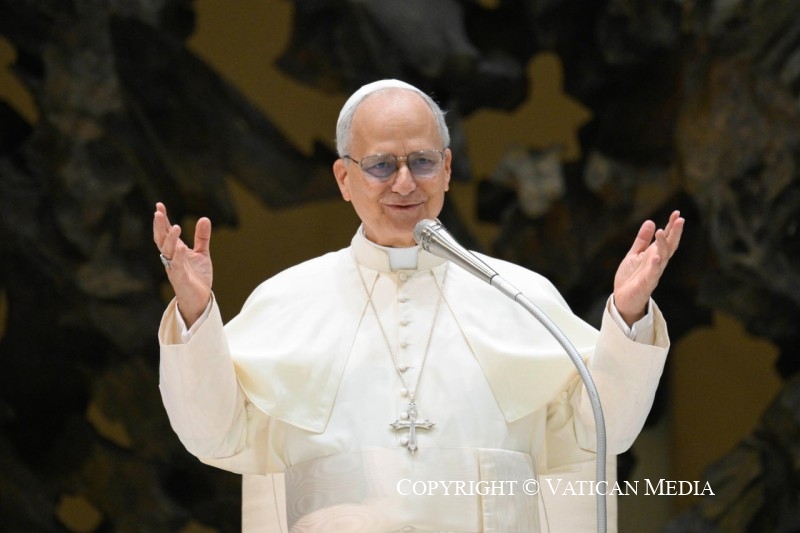Cycle of Catechesis – Jubilee 2025. Jesus Christ our Hope. III. The Passover of Jesus. 2. The betrayal. “Surely it is not I?” (Mk 14,19)
Dear brothers and sisters,
Let us continue our journey in the school of the Gospel, following Jesus’ steps in the final days of his life. Today we will pause at an intimate, dramatic, yet also profoundly true scene: the moment at which, during the Passover supper, Jesus reveals that one of the Twelve is about to betray him: “Amen, I say to you, one of you will betray me, one who is eating with me” (Mk 14:18).
Strong words. Jesus does not utter them to condemn, but to show how love, when it is true, cannot do without the truth. The room on the upper floor, where shortly beforehand everything was carefully prepared, suddenly fills with a painful silence, made up of questions, suspicions, vulnerability. It is a pain we too know well, when the shadow of betrayal is cast over the closest relationships.
And yet, the way in which Jesus speaks about what is about to happen is surprising. He does not raise his voice, nor point his finger, nor utter the name of Judas. He speaks in such a way that each one can ask himself the question. And this is exactly what happens. Saint Mark tells us: “They began to be distressed and to say to him, one by one, ‘Surely it is not I?’” (Mk 14:19).

Dear friends, this question – “Surely it is not I?” – is perhaps among the sincerest that we can ask ourselves. It is not the question of the innocent, but of the disciple who discovers himself to be fragile. It is not the cry of the guilty, but the whisper of him who, while wanting to love, is aware of being able to do harm. It is in this awareness that the journey of salvation begins.
Jesus does not denounce in order to humiliate. He tells the truth because he wants to save. And in order to be saved, it is necessary to feel: to feel that one is involved, to feel that one is beloved despite everything, to feel that evil is real but that it does not have the last word. Only those who have known the truth of a deep love can also accept the wound of betrayal.
The disciples’ reaction is not anger, but sadness. They are not indignant, they are sorrowful. It is a pain that arises from the real possibility of being involved. And precisely this sorrow, if welcomed with sincerity, becomes a place for conversion. The Gospel does not teach us to deny evil, but to recognize it as a painful opportunity for rebirth.
Jesus then adds a phrase that troubles us and makes us think. “But woe to that man by whom the Son of Man is betrayed. It would be better for that man if he had never been born” (Mk 14:21). They are harsh words, certainly, but they must be understood well: it is not a curse, but rather a cry of pain. In Greek, that “woe” sounds like a lamentation, an “alas”, an exclamation of sincere and deep compassion.

We are used to judging. Instead, God accepts suffering. When he sees evil, he does not avenge it, but grieves. And that “better if he had never been born” is not a condemnation imposed a priori, but a truth that any of us can recognize: if we deny the love that has generated us, if by betraying we become unfaithful to ourselves, then we truly lose the meaning of our coming into the world, and we exclude ourselves from salvation.
And yet, precisely there, at the darkest point, the light is not extinguished. On the contrary, it starts to shine. Because if we recognize our limit, if we let ourselves be touched by the pain of Christ, then we can finally be born again. Faith does not spare us from the possibility of sin, but if always offers us a way out of it: that of mercy.
Jesus is not scandalized by our fragility. He knows well that no friendship is immune from the risk of betrayal. But Jesus continues to trust. He continues to sit at the table with his followers. He does not give up breaking bread, even for those who will betray him. This is the silent power of God: he never abandons the table of love, even when he knows he will be left alone.

Dear brothers and sisters, we too can ask ourselves today, with sincerity: “Surely it is not I?”. Not to feel accused, but to open a space for truth in our hearts. Salvation begins here: with the awareness that we may be the ones who break our trust in God, but that we can also be the ones who gather it, protect it and renew it.
Ultimately, this is hope: knowing that even if we fail, God will never fail us. Even if we betray him, he never stops loving us. And if we allow ourselves to be touched by this love – humble, wounded, but always faithful – then we can truly be reborn. And we can begin to live no longer as traitors, but as children who are always loved.
____________________________________________________
Special greetings:
I greet all the English-speaking pilgrims and visitors taking part in today’s Audience, particularly the groups from England, Hungary, Malta, Kenya, South Africa, Uganda, Zambia, India, Indonesia, Iraq, Jerusalem, the Philippines, Vietnam, Barbados and the United States of America. As we prepare to celebrate the Solemnity of the Assumption of Mary into heaven on August 15th, I entrust you and your families to the tender care of Our Lady. Through her intercession may you be strengthened in your weakness, comforted in your trials and given the joy and peace of Jesus Christ, her Son. God bless you.
Source: vatican.va





